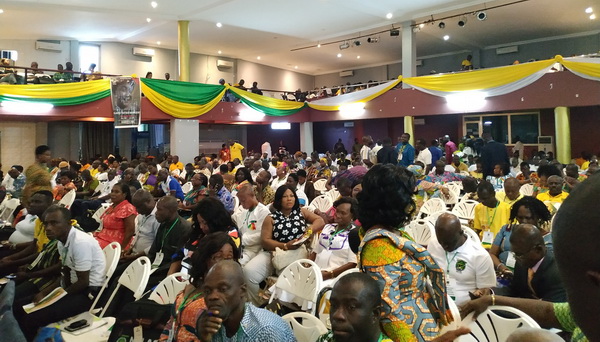
Under-representation of women in governance and decision-making a democratic deficit - NALAG
The National Association of Local Authorities of Ghana (NALAG) has described as a national indictment, the continuous historical low levels of women’s representation in governance.
The blot also represents the failure of the state to take the required decisive initiatives to address the multiple structural, functional and other factors that make it difficult for women to effectively contribute to national development efforts, said the association at a press briefing to mark Africa Day of Decentralization and Local Development.
It was under the theme; Gender Equality; An Effective Approach To Achieving Sustainable Local Governance.
According to NALAG, the under-representation of women at any level of governance and decision-making results in a democratic deficit, saying that it has been proven time and again that diverse groups make better decisions, particularly when it comes to a task as challenging as representing the interests of citizens at the local level.
“Women’s equal participation and representation in local decision-making processes is critical for prioritizing women’s practical needs and issues in local governments’ agendas and for localizing the Sustainable Development Goals (SDGs). Gender-balanced local councils may be an important step in helping to attain gender balance at the national levels.”
Below is the full address.
AFRICA DAY OF DECENTRALIZATION AND LOCAL DEVELOPMENT
PRESS BRIEFING OF THE NATIONAL ASSOCIATION OF LOCAL AUTHORITIES OF GHANA ON 10TH AUGUST, 2019
GENDER EQUALITY; AN EFFECTIVE APPROACH TO ACHIEVING SUSTAINABLE LOCAL GOVERNANCE
The African Union Policy Organs in January 2012 established 10th August of each year as the Africa Day of Decentralization and Local Development. The purpose of this celebration is to promote peace, stability and sustainable governance. This year, the National Association of Local Authorities of Ghana (NALAG) has adopted the theme; “GENDER EQUALITY; AN EFFECTIVE APPROACH TO ACHIEVING SUSTAINABLE LOCAL GOVERNANCE” for the celebration of the African Day of Decentralization and Local Development.
Representing over a half of the nation’s population, women on the national and sub-national level are still under-represented in Ghana’s local governance system.
The under-representation of women at any level of governance and decision-making results in a democratic deficit. It has been proven time and again that diverse groups make better decisions, particularly when it comes to a task as challenging as representing the interests of citizens at the local level. Women’s equal participation and representation in local decision-making processes is critical for prioritizing women’s practical needs and issues in local governments’ agendas and for localizing the Sustainable Development Goals (SDGs). Gender-balanced local councils may be an important step in helping to attain gender balance at the national levels.
The continuous historical low levels of women’s representation in governance, both at the local and national levels, is a national indictment and represents the failure of the state to take the required decisive initiatives to address the multiple structural, functional and other factors that make it difficult for women to effectively contribute to national development efforts. Since the inception of District Assembly Elections in Ghana, women have been unable to attain the 30% UN-recommended minimum threshold in representation in the Assemblies, making gender-based inclusion in local governance a major deficit in equality in participation.
The adoption of decentralization in Ghana’s governance processes was, envisaged to promote popular participation and bring governance to the doorstep of people at the local level — and women and other disadvantaged groups are expected to actively participate in decision making at the Assemblies.
However, after almost twenty years of implementing the decentralization system in Ghana, the expectation that policies and programmes will be initiated to respect, protect and promote women’s rights and gender equality has not been sufficiently realized.
Furthermore, the ability of women to participate and be represented in decision-making, have access to and control over productive resources have also been problematic as legislation on decentralization have not fully articulated women’s needs, demands and concerns.
The right moment has come for governments, civil society and the international community to come together and decide on the next action plans to ensure women participation in governance, especially on leadership opportunities that have an additional multiplier effect on empowering women and girls. NALAG believe that to realize meaningful and lasting changes in women empowerment and equality it is fundamental to provide women with continual opportunities for capacity development in decision and policy making process.
The up-coming Local Level Elections in Ghana in December 2019 is an opportunity to mobilize women for increased participation and effective discourse in the District Assemblies.
The National Association of Local Authorities of Ghana is embarking on campaign this year to get more women elected into the Local Assemblies through various activities which includes building the capacities of women aspiring to contest this year’s District Level Elections, creating a stronger network of women in Local Government through our Women’s Forum and creating the platform for shared learning and mentoring for new aspiring contestants.
We call on government, educational institutions, industries, professional associations, women’s networks, non-profit bodies and the media to join in the campaign to promote a gender-balanced society for grassroot development in our Assemblies and other departments and institutions in government.
SIGNED:
HON. KOKRO AMANKWAH
GENERAL SECRETARY, NALAG
Cc: Women Caucus Representative, NALAG
